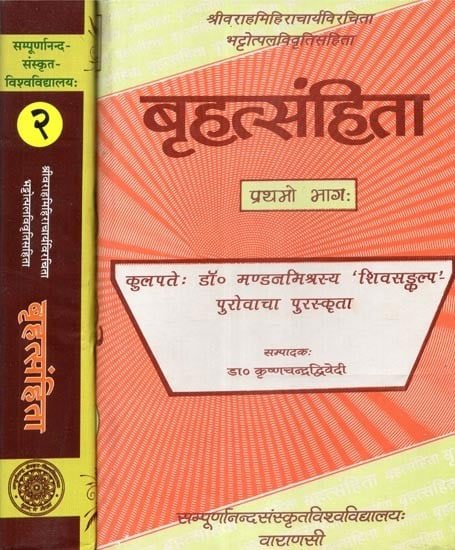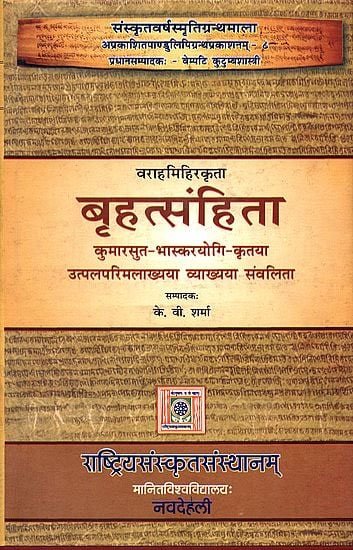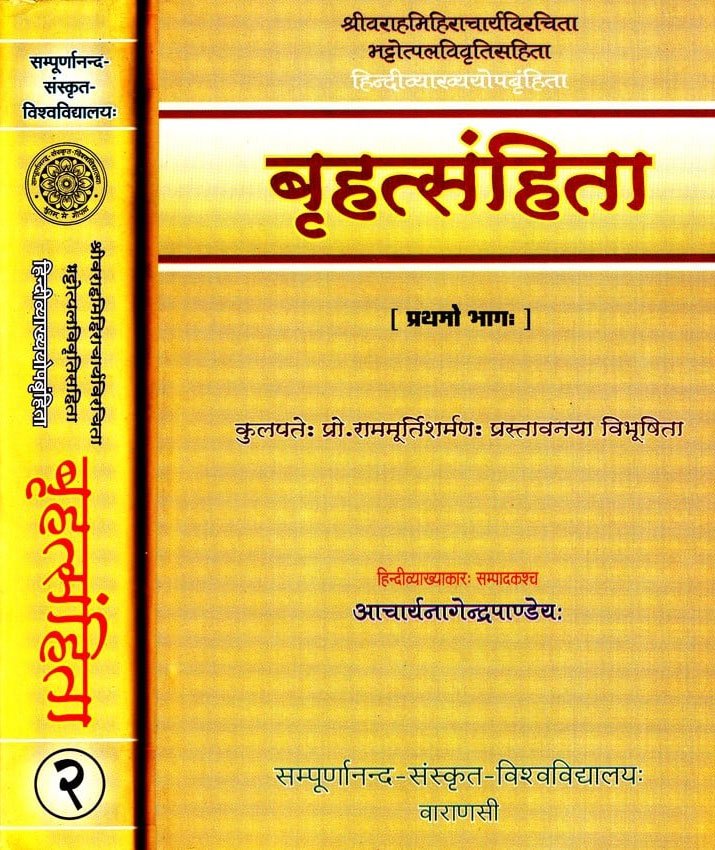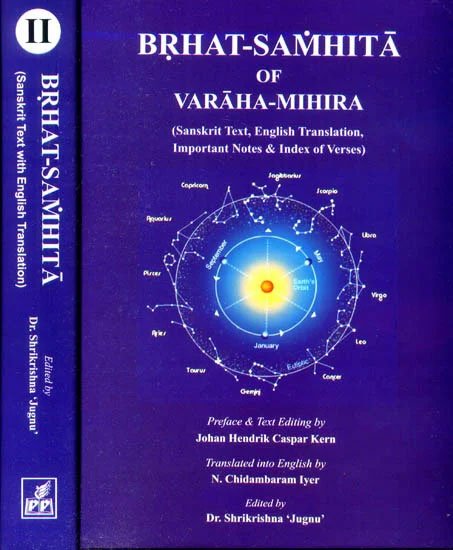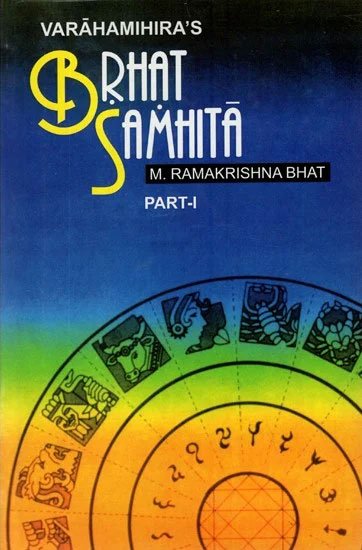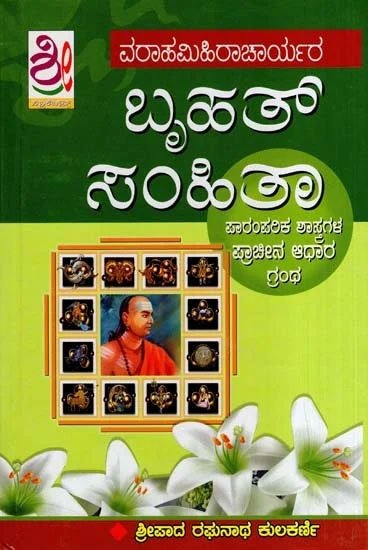Brihat-samhita [sanskrit]
26,560 words
The Sanskrit text of the Brihat-samhita from the 6th-century authored by Varaha Mihira in present-day Ujjain, India. It primarily deals with astrology and astronomy but is presented as an encyclopedia of knowledge.
Verse 57.40
शाम्बश्च गदाहस्तः प्रद्युम्नश्चापभृत्सुरूपश्च ।
अनयोः स्त्रियौ च कार्ये खेटकनिस्त्रिंशधारिण्यौ ॥ ४० ॥
śāmbaśca gadāhastaḥ pradyumnaścāpabhṛtsurūpaśca |
anayoḥ striyau ca kārye kheṭakanistriṃśadhāriṇyau || 40 ||
The Sanskrit text of Verse 57.40 is contained in the book Brihata Samhita (Sanskrit Text with Hindi Translation) by Pandit Achyutananda Jha. This book is available online or you could buy the latest edition:
Read online Buy now! The Sanskrit text by Pandit Achyutananda Jha (2001)
Glossary of Sanskrit terms
Note: This extracts Sanskrit terms and links to English definitions from the glossary, based on an experimental segmentation of verse (57.40). Some terms could be superfluous while some might not be mentioned. Click on the word to show English definitions.
Shamba, Gadahasta, Pradyumna, Capa, Bhrit, Rupa, Ana, Iyam, Idam, Stri, Karya, Khetaka, Nya,
Analysis of Sanskrit grammar
Note: this is an experimental feature and only shows the first possible analysis of the Sanskrit text (Verse 57.40). If the system was successful in segmenting the sentence, you will see of which words it is made up of, generally consisting of Nouns, Pronouns, Verbs, Participles and Indeclinables. Click on the link to show all possible derivations of the word.
- Line 1: “śāmbaśca gadāhastaḥ pradyumnaścāpabhṛtsurūpaśca ”
- śāmbaś -
-
śāmba (noun, masculine)[nominative single]
- ca -
-
ca (indeclinable conjunction)[indeclinable conjunction]ca (noun, masculine)[compound], [vocative single]ca (noun, neuter)[compound], [vocative single]
- gadāhastaḥ -
-
gadāhasta (noun, masculine)[nominative single]
- pradyumnaś -
-
pradyumna (noun, masculine)[nominative single]
- cāpa -
-
cāpa (noun, masculine)[compound], [vocative single]cāpa (noun, neuter)[compound], [vocative single]
- bhṛtsu -
-
bhṛt (noun, masculine)[locative plural]bhṛt (noun, neuter)[locative plural]
- rūpaś -
-
rūpa (noun, masculine)[nominative single]
- ca -
-
ca (indeclinable conjunction)[indeclinable conjunction]ca (noun, masculine)[compound], [vocative single]ca (noun, neuter)[compound], [vocative single]
- Line 2: “anayoḥ striyau ca kārye kheṭakanistriṃśadhāriṇyau ”
- anayoḥ -
-
ana (noun, masculine)[genitive dual], [locative dual]iyam (noun, feminine)[genitive dual], [locative dual]idam (pronoun, masculine)[genitive dual], [locative dual]idam (pronoun, neuter)[genitive dual], [locative dual]idam (pronoun, feminine)[genitive dual], [locative dual]
- striyau -
-
strī (noun, feminine)[nominative dual], [vocative dual], [accusative dual]
- ca -
-
ca (indeclinable conjunction)[indeclinable conjunction]ca (noun, masculine)[compound], [vocative single]ca (noun, neuter)[compound], [vocative single]
- kārye -
-
kārya (noun, masculine)[locative single]kārya (noun, neuter)[nominative dual], [vocative dual], [accusative dual], [locative single]kāryā (noun, feminine)[nominative dual], [vocative single], [vocative dual], [accusative dual]√kṛ -> kārya (participle, masculine)[locative single from √kṛ class 1 verb], [locative single from √kṛ class 2 verb], [locative single from √kṛ class 5 verb], [locative single from √kṛ class 8 verb], [locative single from √kṛ]√kṛ -> kārya (participle, neuter)[nominative dual from √kṛ class 1 verb], [vocative dual from √kṛ class 1 verb], [accusative dual from √kṛ class 1 verb], [locative single from √kṛ class 1 verb], [nominative dual from √kṛ class 2 verb], [vocative dual from √kṛ class 2 verb], [accusative dual from √kṛ class 2 verb], [locative single from √kṛ class 2 verb], [nominative dual from √kṛ class 5 verb], [vocative dual from √kṛ class 5 verb], [accusative dual from √kṛ class 5 verb], [locative single from √kṛ class 5 verb], [nominative dual from √kṛ class 8 verb], [vocative dual from √kṛ class 8 verb], [accusative dual from √kṛ class 8 verb], [locative single from √kṛ class 8 verb], [nominative dual from √kṛ], [vocative dual from √kṛ], [accusative dual from √kṛ], [locative single from √kṛ]√kṛ -> kāryā (participle, feminine)[nominative dual from √kṛ class 1 verb], [vocative single from √kṛ class 1 verb], [vocative dual from √kṛ class 1 verb], [accusative dual from √kṛ class 1 verb], [nominative dual from √kṛ class 2 verb], [vocative single from √kṛ class 2 verb], [vocative dual from √kṛ class 2 verb], [accusative dual from √kṛ class 2 verb], [nominative dual from √kṛ class 5 verb], [vocative single from √kṛ class 5 verb], [vocative dual from √kṛ class 5 verb], [accusative dual from √kṛ class 5 verb], [nominative dual from √kṛ class 8 verb], [vocative single from √kṛ class 8 verb], [vocative dual from √kṛ class 8 verb], [accusative dual from √kṛ class 8 verb], [nominative dual from √kṛ], [vocative single from √kṛ], [vocative dual from √kṛ], [accusative dual from √kṛ]√kṛ -> kārya (participle, masculine)[locative single from √kṛ class 3 verb], [locative single from √kṛ class 6 verb]√kṛ -> kārya (participle, neuter)[nominative dual from √kṛ class 3 verb], [vocative dual from √kṛ class 3 verb], [accusative dual from √kṛ class 3 verb], [locative single from √kṛ class 3 verb], [nominative dual from √kṛ class 6 verb], [vocative dual from √kṛ class 6 verb], [accusative dual from √kṛ class 6 verb], [locative single from √kṛ class 6 verb]√kṛ -> kāryā (participle, feminine)[nominative dual from √kṛ class 3 verb], [vocative single from √kṛ class 3 verb], [vocative dual from √kṛ class 3 verb], [accusative dual from √kṛ class 3 verb], [nominative dual from √kṛ class 6 verb], [vocative single from √kṛ class 6 verb], [vocative dual from √kṛ class 6 verb], [accusative dual from √kṛ class 6 verb]√kṝ -> kārya (participle, masculine)[locative single from √kṝ class 5 verb], [locative single from √kṝ class 9 verb]√kṝ -> kārya (participle, neuter)[nominative dual from √kṝ class 5 verb], [vocative dual from √kṝ class 5 verb], [accusative dual from √kṝ class 5 verb], [locative single from √kṝ class 5 verb], [nominative dual from √kṝ class 9 verb], [vocative dual from √kṝ class 9 verb], [accusative dual from √kṝ class 9 verb], [locative single from √kṝ class 9 verb]√kṝ -> kāryā (participle, feminine)[nominative dual from √kṝ class 5 verb], [vocative single from √kṝ class 5 verb], [vocative dual from √kṝ class 5 verb], [accusative dual from √kṝ class 5 verb], [nominative dual from √kṝ class 9 verb], [vocative single from √kṝ class 9 verb], [vocative dual from √kṝ class 9 verb], [accusative dual from √kṝ class 9 verb]√kṛ (verb class 0)[present passive first single]
- kheṭaka -
-
kheṭaka (noun, masculine)[compound], [vocative single]kheṭaka (noun, neuter)[compound], [vocative single]
- nistriṃśadhāri -
-
nistriṃśadhārin (noun, masculine)[compound], [adverb]
- ṇyau -
-
ṇya (noun, masculine)[nominative dual], [vocative dual], [accusative dual]
Other editions:
Also see the following editions of the Sanskrit text or (alternative) English translations of the Verse 57.40
Brhatsamhita with the Commentary of Bhattotpala
by Krishna Chandra Dwivedi (2016)
Publisher: Sampurnanand Sanskrit University; 1229 pages;
Buy now!
Brihat Samhita with the Commentary of Utpalapatimala of Yogisvara
by K. V. Sharma (2012)
Publisher: Rashtriya Sanskrit Sansthan, Janakpuri; 754 pages; ISBN-10; 8186111360; ISBN-13: 9788186111369
Buy now!
Brihat Samhita (Hindi Translation)
by K. V. Sharma (2002)
Publisher: Sampurnanand Sanskrit University; 2359 pages; ISBN-13: 9789387890008.
Buy now!
Brhat Samhita (English translation)
by N. Chidambaram Iyer (2022)
Publisher: Parimal Publication Pvt. Ltd.; 801 pages; Edited by Dr. Shrikrishna Jugnu; ISBN-10: 8171104215; ISBN-13: 9788171104215.
Buy now!
Brhat Samhita (English with notes)
by M. Ramakrishna Bhat (2010)
Publisher: Motilal Banarsidas Publishers Pvt. Ltd.; 1155 pages; ISBN-10: 8120810600; ISBN-13: 9788120810600.
Buy now!
Brhat Samhita (Telugu translation)
by Sishtla Umamaheswara Sharma (2020)
Publisher: Mohan Publications, Andhra Pradesh; 846 pages.
Buy now!Preview of verse 57.40 in Kannada sript:
ಶಾಮ್ಬಶ್ಚ ಗದಾಹಸ್ತಃ ಪ್ರದ್ಯುಮ್ನಶ್ಚಾಪಭೃತ್ಸುರೂಪಶ್ಚ ।
ಅನಯೋಃ ಸ್ತ್ರಿಯೌ ಚ ಕಾರ್ಯೇ ಖೇಟಕನಿಸ್ತ್ರಿಂಶಧಾರಿಣ್ಯೌ ॥ ೪೦ ॥
Brhat Samhita (Gujarati translation)
by - (2000)
Publisher: Shree Harihar Pustakalay, Surat; Author: Shri Varahamihira Acharya (શ્રી વરાહમિહીરાચાર્ય); 432 pages.
Buy now!Preview of verse 57.40 in Gujarati sript:
શામ્બશ્ચ ગદાહસ્તઃ પ્રદ્યુમ્નશ્ચાપભૃત્સુરૂપશ્ચ ।
અનયોઃ સ્ત્રિયૌ ચ કાર્યે ખેટકનિસ્ત્રિંશધારિણ્યૌ ॥ ૪૦ ॥
Brhat Samhita (Kannada translation)
by Sripada Raghunatha Kulkarni (2021)
Publisher: Srinidhi Publications, Bangalore; 668 pages with illustrations.
Buy now!Preview of verse 57.40 in Kannada sript:
ಶಾಮ್ಬಶ್ಚ ಗದಾಹಸ್ತಃ ಪ್ರದ್ಯುಮ್ನಶ್ಚಾಪಭೃತ್ಸುರೂಪಶ್ಚ ।
ಅನಯೋಃ ಸ್ತ್ರಿಯೌ ಚ ಕಾರ್ಯೇ ಖೇಟಕನಿಸ್ತ್ರಿಂಶಧಾರಿಣ್ಯೌ ॥ ೪೦ ॥
![Brihat-samhita [sanskrit] - book cover](/uploads/a/Brihat-Samhita-Sanskrit.jpg)
